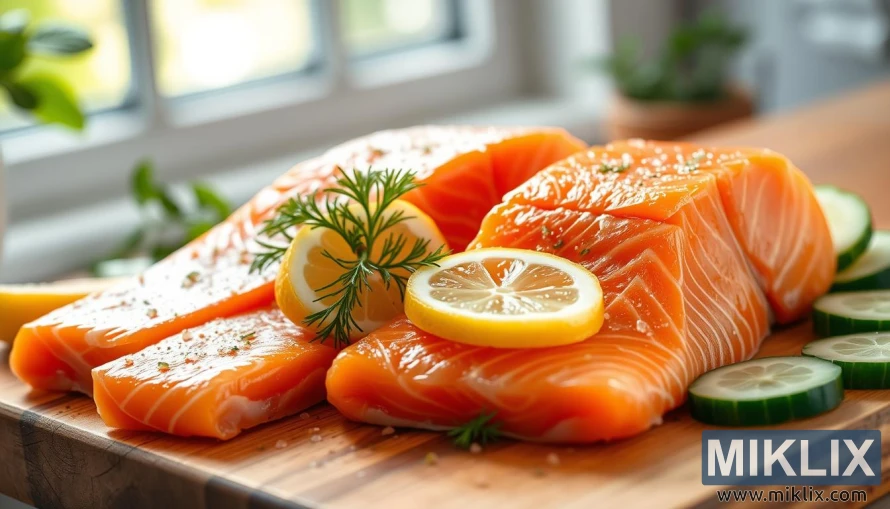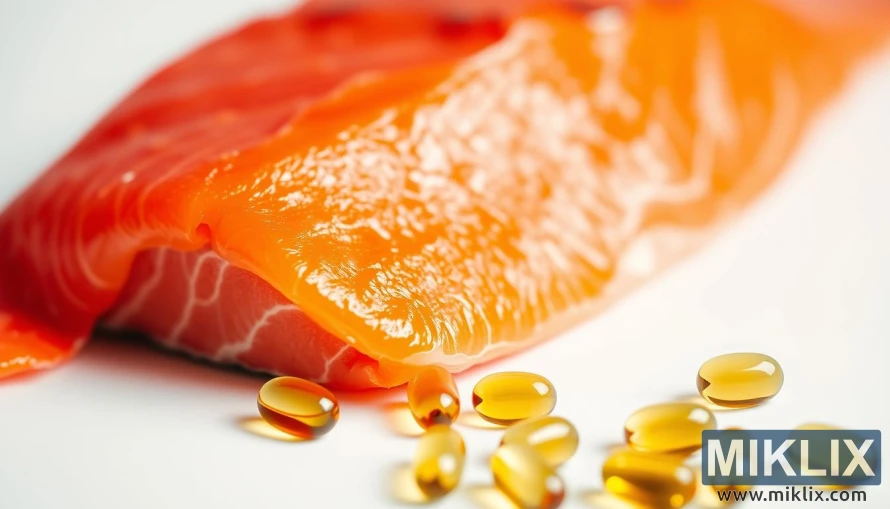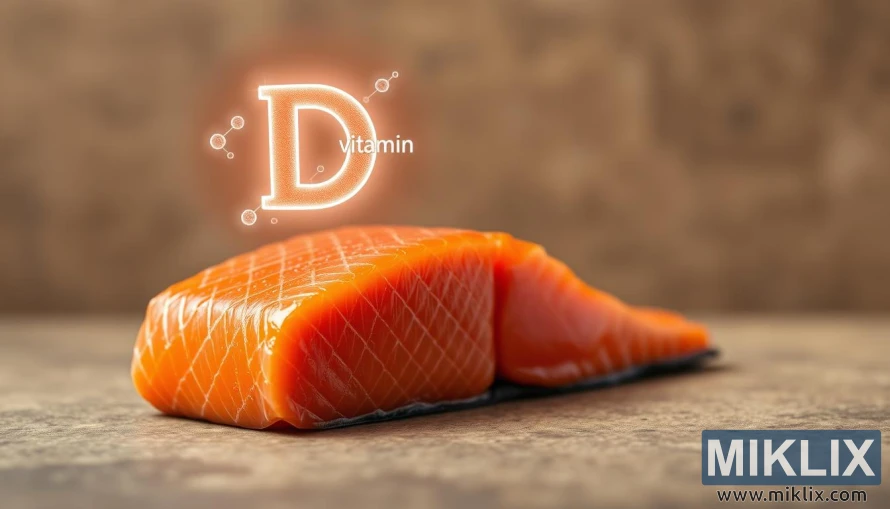Omega Gold: Health Benefits of Eating Salmon Regularly
Published: May 15, 2025 at 11:50:03 AM UTC
Salmon is a favorite fatty fish all over the world. It's loved for its taste and its health benefits. Salmon is full of nutrients that are good for you. It's packed with omega-3 fatty acids. These are great for your heart and brain. We'll look at why salmon is good for you and how to make it part of your meals.

Key Takeaways
- Salmon is rich in omega-3 fatty acids, promoting heart health.
- It provides high-quality protein essential for muscle maintenance.
- Salmon contains vital B vitamins that support energy metabolism.
- This fish is beneficial for brain function and mental health.
- Incorporating salmon into your diet can assist with weight management.
- Salmon can be prepared in various delightful ways, enriching your meals.
Introduction to Salmon and Its Popularity
Salmon is a favorite in the United States for its tender texture and rich flavor. It's a key ingredient in many homes. Different types like Sockeye, Pink, Coho, and King (Chinook) come from the Pacific Ocean. Atlantic salmon, found in most stores, is mainly raised on farms due to U.S. fishing limits.
Salmon's appeal lies in its flexibility in cooking. It works well for grilling, baking, and poaching. This makes it perfect for both simple and fancy dishes.
Rich Nutritional Profile of Salmon
Salmon is a favorite among those who care about their health. A 3.5-ounce or 100-gram serving of salmon has about 206 calories if it's farmed. Wild salmon has 182 calories. It's packed with high-quality protein, giving you 22 to 25 grams per serving.
Salmon is also a great source of important vitamins like B12, B6, and D. It has minerals like selenium and phosphorus too. The real highlight is its omega-3 fatty acids, with farmed salmon having 2.3 grams and wild salmon having 2.2 grams.
This mix of nutrients boosts your health and makes salmon a top choice. Many people love it for its vitamins and minerals. It's a delicious way to get the nutrients you need.
Omega-3 Fatty Acids: The Heart Health Hero
Salmon is packed with omega-3 fatty acids, which are great for your heart. These fats help reduce inflammation and boost heart health. Eating them regularly can lower blood pressure and triglycerides, cutting down heart disease risk.
Research shows that eating salmon twice a week boosts omega-3 levels in your blood. This supports healthy blood vessels and prevents plaque buildup. Adding omega-3s to your diet can make your heart healthier, making salmon a tasty and good-for-you choice.

High-Quality Protein Source
Salmon is a top-notch protein source, vital for our bodies. A 3.5-ounce serving has 22 to 25 grams of protein. This is key for building and repairing muscles.
It also has all the amino acids our bodies need. These amino acids help make hormones and enzymes.
Eating salmon helps keep your muscles strong. It also boosts your metabolism. This is great for those trying to lose weight without losing muscle.
Choosing high-protein foods like salmon makes you feel full longer. It also gives you more energy all day.
Essential B Vitamins Found in Salmon
Salmon is not just tasty but also packed with B vitamins. A single serving can give you over 100% of the Daily Value of vitamin B12. This vitamin is key for keeping you full of energy. Other B vitamins like B6, niacin, and riboflavin are also important for your body.
B vitamins help turn food into energy. They make sure your body can use carbs, fats, and proteins well. They also help keep your brain sharp and your body's systems working right.
Salmon's B vitamins have anti-inflammatory effects. This can help lower long-term inflammation and support your body's health. These vitamins work together to support your brain health, making salmon a great choice for your diet.
Salmon and Bone Health
Salmon is great for your bones because it's full of nutrients that help make bones strong. It's packed with vitamin D, which is key for absorbing calcium. A piece of salmon gives you about 66% of the vitamin D you need every day.
Eating salmon helps your bones in many ways:
- It helps your body absorb calcium, which is important for strong bones.
- It gives you phosphorus, a mineral that helps bones stay dense.
- It helps older adults keep their bones from getting weaker, which is very important.
Adding salmon to your meals is not just good for your bones. It also helps protect against osteoporosis. So, eating salmon can make your meals not only delicious but also good for your bones.

Supports Brain Function and Mental Health
Eating salmon can greatly improve brain health. It's packed with omega-3 fatty acids, which are key for brain function and mental health. These healthy fats help protect against brain decline and diseases like Alzheimer's.
Omega-3 fatty acids also play a big role in mental health. Eating salmon regularly can help reduce depression and anxiety symptoms. People who eat foods rich in omega-3s, like salmon, often feel happier and less stressed.
Astaxanthin: The Antioxidant Powerhouse
Astaxanthin is a powerful antioxidant found in salmon, giving it its bright pink color. It helps protect cells from damage caused by oxidative stress. This damage can lead to diseases like heart disease and cancer.
Astaxanthin is special because it can neutralize free radicals better than many other antioxidants. This makes it a great addition to any diet.
Astaxanthin also helps with skin health. Studies show it can make skin more elastic, reduce wrinkles, and protect against UV damage. Eating salmon not only gives you protein but also boosts your health and beauty.
Salmon and Weight Management
Salmon is great for those trying to manage their weight. It's packed with protein, which helps you feel full and control your appetite. Eating salmon can stop you from overeating and keep your diet balanced.
Studies show that omega-3 fatty acids in salmon are key for losing weight. They're very helpful for people with belly fat. Salmon's healthy fats boost your metabolism, aiding in weight loss.
Eating salmon regularly is good for your body and health. It's a win-win for controlling your weight and feeling better overall.
Delicious and Versatile Ways to Include Salmon in Your Diet
Salmon is a versatile fish that can be enjoyed in many different forms. You can grill, bake, or poach it, and its rich flavors always come through. It's easy to make salmon a staple in your meal ideas.
For those short on time, canned salmon is a quick solution. Use it in a fresh salad or make delicious salmon burgers. With fresh or frozen salmon, simple herbs can make your dish tasty and healthy.
Here are some delicious salmon recipes to try:
- Grilled salmon with lemon and dill
- Baked salmon with garlic and asparagus
- Poached salmon served with a caper sauce
- Sushi rolls filled with fresh salmon
These cooking methods let everyone create meal ideas that fit their taste. Salmon's flexibility makes it perfect for a balanced diet, providing essential nutrients.
Potential Health Risks of Eating Salmon
Salmon is known for its health benefits. But eating too much can lead to health problems. This is due to contaminants like mercury and PCBs. These pollutants are more common in farmed salmon than in wild salmon.
Some people are more at risk from these pollutants. This includes:
- Pregnant individuals
- Children
- Individuals with weakened immune systems
Choosing wild salmon can lower the risk of these health issues. Knowing where your salmon comes from is key. It helps you avoid harmful mercury levels, making a safer choice for you and your family.
Wild vs. Farmed Salmon: What's the Difference?
Many people wonder about the difference between wild and farmed salmon. Knowing the nutritional differences helps us choose better seafood. Wild salmon is leaner and has less saturated fat. It's prized for its natural taste and lower risk of contamination.
Farmed salmon, on the other hand, is more affordable and has more omega-3s. These fats are good for the heart. But, there are worries about pollutants and the quality of their food. Those who care about the environment might think about these issues.
Choosing between wild and farmed salmon depends on what you value. It's about finding the right balance for your health and taste preferences.
Conclusion
Salmon is a nutritional powerhouse with many health benefits. It's packed with omega-3 fatty acids, high-quality protein, and essential vitamins. These nutrients support heart health, improve brain function, and keep skin healthy.
Eating salmon two times a week can greatly improve your overall health. Salmon is versatile and can be enjoyed in many ways. You can grill it, make salads, or add it to pasta.
Salmon is great for managing weight and boosting nutrition. Adding it to your meals can make your diet healthier. Enjoy the taste and health benefits of salmon and live a healthier life!
Further Reading
If you enjoyed this post, you may also like these suggestions:
- Quinoa: Tiny Grain, Big Impact on Your Health
- The Power of the Leaf: Why Cabbage Deserves a Spot on Your Plate
- Fuel Your Microbiome: The Surprising Benefits of Inulin Supplements
